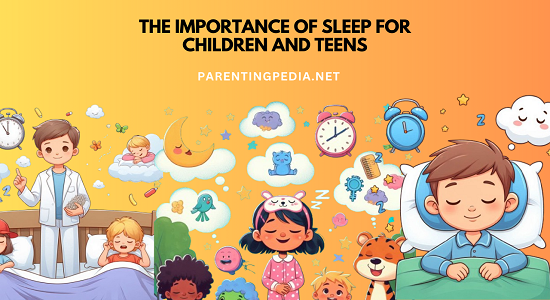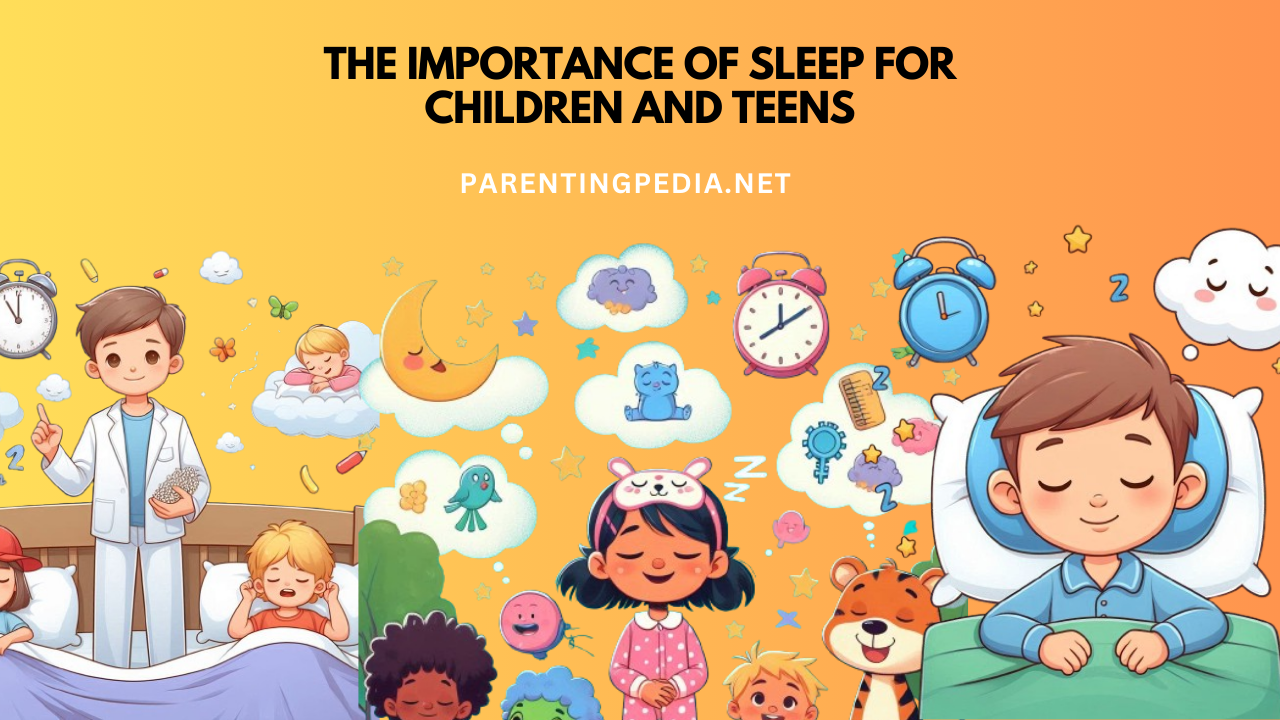Importance of sleep for overall well-being of children and teens cannot be understated. It plays an important role in physical health, cognitive function, emotional well-being, and overall development of children. During critical developmental years of child, adequate sleep supports growth, immune function, and academic performance while having effect on mood regulation and social interactions too. Not only children and teens, adequate sleep is important for health of adults too. Though importance of sleep cannot be denied, yet, it is often undervalued, leading to various health and developmental issues in children. This article talks about significance of sleep for children and teens, and how quality sleep is much needed for physical and psychological benefits for children.
Importance Of Sleep For Physical Health And Growth
Growth and Development: Sleep is critical for physical growth and development in children and teens. During sleep, the body releases growth hormones that are essential for tissue and muscle growth, repair, and overall physical development. Sleep is particularly important for teens during puberty, as it supports rapid physical growth, hormone regulation, and brain development.
Immune System Function: Adequate sleep helps in strengthening the immune system too. During sleep, body produces immune cells that help fight infection and inflammation and also reduce stress in body. Lack of sleep can weaken the immune system, making children and teens more prone to illnesses such as the common cold and flu.
Weight Management: Sleep also plays an important role in weight management. Insufficient sleep can disrupt the balance of hormones that regulate hunger, leading to increased appetite and potential weight gain. This imbalance can contribute to obesity which is a growing concern among children and teens.
Importance Of Sleep For Cognitive Function and Academic Performance
Memory and Learning: Sleep is essential for cognitive functions such as memorization power , learning, and problem-solving. During sleep, the brain processes and stores information that you acquired during the day. This process is important for academic success, as it enhances the ability to recall information and apply knowledge.
Also Read: 10 Simple Ways To Improve Your Toddler’s Sleep Schedule
Attention and Concentration: Adequate sleep improves attention, concentration, and decision-making skills in children. Children and teens who understand importance of sleep and get sufficient sleep are more likely to stay focused and engaged in school activities, leading to better academic performance. In contrast, sleep-deprived students often face negative consequences such as short attention span, less focus power, increased stress, and long-term health issues.
Creativity and Critical Thinking: Quality sleep also promotes creativity and critical thinking in children. Adequate rest allows brain to function well, enabling children to think creatively and critically, which is crucial for their academic and personal growth. A well-rested child is more likely to think innovative ideas and solutions rather than sleep deprived child.
Importance Of Sleep For Emotional And Mental Well-Being In Children
Mood Regulation: Sleep has huge impact on emotional and mental health of child. Adequate sleep helps stabilize mood and reduce the risk of mood disorders such as depression and anxiety. Sleep-deprived children and teens are more prone to irritability, mood swings, and emotional instability.
Stress Management: Sleep helps manage stress by reducing stress hormones in our body. Chronic sleep deprivation can lead to elevated cortisol levels, increasing the risk of stress-related conditions such as anxiety and depression. A good night’s sleep enhances resilience to stress and improves overall emotional well-being.
Social Interactions: Adequate sleep is crucial for healthy social interactions. Well-rested children and teens are more likely to engage positively with other people and develop strong interpersonal relationships. In contrast, sleep-deprived children and teens may struggle with social interactions, leading to loneliness and social difficulties in conversing with others.
Importance Of Sleep In Behavior Of Children And Teens
Adequate and quality sleep helps in improving brain performance, mood and health of children and teens. Importance of sleep cannot be denied in behavior such as impulse control and decision-making. Well-rested children and teens are able to make thoughtful decisions and resist impulsive behaviors. Importance of sleep is such that sleep deprivation in children can weaken their judgement and decision making abilities. Lack of sleep can increase the chances of children and teens engaging in risky behaviors such as violence and abuse, reckless driving etc.

Importance Of Sleep In Maintaining Health Of Children And Teens
Adequate sleep is important for physical and mental health of children. Lack of sleep can lead to long term health consequences such as:
Chronic Health Conditions: Lack of sleep in childhood and adolescence can have long-term health consequences. It increases the risk of developing chronic diseases such as hypertension, diabetes and even cardiovascular diseases. Prioritizing sleep during these growing years can help prevent these conditions and promote long-term health.
Lifelong Sleep Patterns: Establishing healthy sleep patterns in childhood and teenage sets the foundation for lifelong sleep habits. Children and teens who learn the importance of sleep and establish good sleeping habits are more likely to continue these habits into adulthood, leading to better overall health and well-being.
Strategies For Improving Sleep In Children And Teens
Establishing a Sleep Routine: Creating a consistent sleep routine is essential for improving sleep quality. Children and teens should go to bed and wake up at the same time every day, even on weekends. This consistency helps build sleep routine and promotes better sleep.
Creating a Sleep-Friendly Environment: The sleep environment plays an important role in sleep quality. Bedrooms should be cool, dark, and quiet, with comfortable mattresses and pillows. Reducing exposure to screens such as TVs, computers, and smartphones before bedtime can also improve quality of sleep.
Encouraging Physical Activity: Regular physical activity can promote better sleep. Children and teens should engage in physical activity everyday. However, it is essential to avoid exercise and outdoor play-time close to bedtime, as it can interfere with the ability to fall asleep.
Limiting Caffeine and Sugar Intake: Caffeine and sugar can disrupt sleep patterns. Limiting the consumption of beverages that contain caffeine such as tea and coffee and sugary snacks, especially in the afternoon and evening, can help improve sleep quality.
Stress Management Techniques: Teaching children and teens stress management techniques such as meditation and deep breathing exercises can help improve sleep. Reducing stress levels can make it easier to fall asleep and stay asleep throughout the night.
Conclusion
The importance of sleep for children and teens cannot be undervalued. Sleep plays a major role in physical health, cognitive function, emotional well-being, and overall development of children. Adequate sleep is also important for children and teens because it strengthens the immune system, helps in weight management and enhances academic performance. By teaching importance of sleep to children and implementing healthy sleep habits, parents and educators can help children and teens grow and develop well. Prioritizing sleep not only benefits immediate health and development but also establishes a foundation for lifelong wellness and success.
FAQ
Why is sleep important to children?
Sleep is essential for children as it plays an important role in physical growth, cognitive development, and emotional well-being of children. Adequate sleep enhances memory, learning, and attention, while also boosting the immune system and overall health. Proper sleep habits help children to perform well academically, socially, and physically.
How does lack of sleep affect child development?
Lack of sleep negatively impacts child development by slowing down physical and mental growth and causing emotional instability. It weakens the immune system, increases the risk of obesity and lead to bad behavior in children. Poor sleep habits can lead to long-term health issues and slow development in children.
Remember, the greatest reward of parenting lies in watching
your children soar with love and confidence.
Till then keep smiling and be happy
🎉 Score Freebies by Completing Fun Offers – Start Now!

